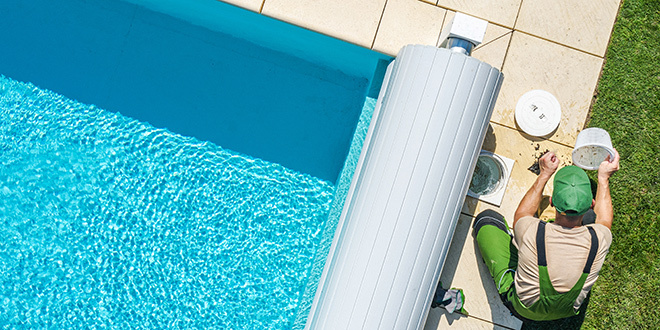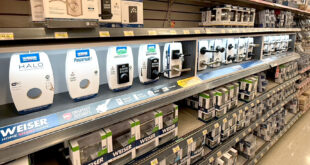While the increase of homeowners adding pools and hot tubs to their homes during the pandemic was a boon to many retailers, it also came with some challenges. All of those extra pools and hot tubs meant an increase in a need for chlorine at the same time BioLab, one of the major chlorine plants in Louisiana, burned down in the wake of Hurricane Laura.
Rusty Wescott, manager of Poultney Pools and Hardware in West Rutland, Vermont, says that even though his supplier didn’t buy from BioLab, he knew the accident would still affect his operation. The plant couldn’t manufacture chlorine anymore, and it lost whole warehouses of products ready to be sold. All those companies that did buy from BioLab would now be looking for alternatives, potentially taking away products from Wescott’s customers.
“It created huge ripples through the pool and hot tub industry,” he says.
For Wescott, handling the chlorine shortage came down to transparency and honesty with his customers. Early in 2021, before the rush of pool season, he sent a detailed newsletter to customers explaining the potential shortage issues and how Poultney Pools planned on handling any shortages.
Another key was having a good relationship with his supplier. That supplier made him a promise that they would still provide the same quantity of chlorine the store had purchased the year before, but it would potentially be in different container sizes.
“While I couldn’t have the variety of choices I had the year before, they did manage to supply us with the same volume by weight that we typically purchase,” Wescott says. “If we were not loyal and faithful to this particular company, we would not have fared as well as we did. We still ran out, but when we did, it was short term, measured in days, not months or weeks.”
Alternatives to Chlorine
While it’s the most popular, chlorine isn’t the only chemical available to homeowners to keep their pools and hot tubs clean, healthy and safe. In light of the BioLab chlorine plant fire in 2020 and other chlorine supply chain issues, here are some of the chlorine alternatives you can share with customers as they maintain their pools and hot tubs.
Bromine
This chemical acts as a sanitizer, oxidizer and algaecide, and it is slightly more expensive but less irritating than chlorine. Bromine comes in different forms, including powdered, tablets and liquid. Optimal bromine chemical level for pools is 3 ppm, and is 4 ppm for hot tubs.
Saltwater Pools
Saltwater pools are actually chlorinated pools. These pools have a salt chlorine generator that electrically changes the sodium chloride, common table salt, that pool owners add to the water into hypochlorite or liquid chlorine. Salt levels should be between 2,700 and 3,400 ppm.
Baquacil
This non-chlorine product has no bleaching effects, strong odors and doesn’t dry out skin like chlorine does. It works as a sanitizer, oxidizer and algaecide to keep pools and hot tubs clean. Baquacil sanitizer levels should be kept between 40 and 50 ppm.
For ideas on how to merchandise and market these pool and hot tub accessories, as well as other outdoor living products, click here.
Source: Centers for Disease Control and Prevention, Healthy Swimming
 Hardware Retailing The Industry's Source for Insights and Information
Hardware Retailing The Industry's Source for Insights and Information






